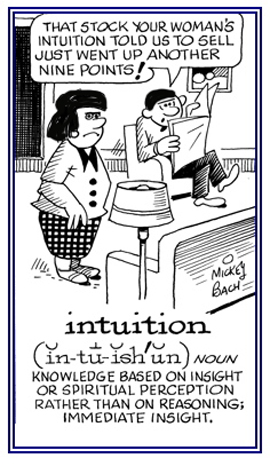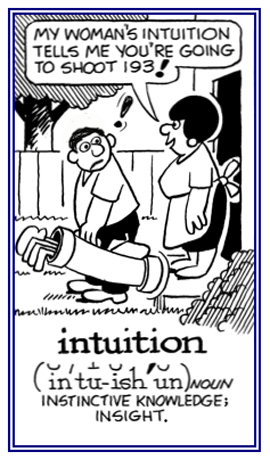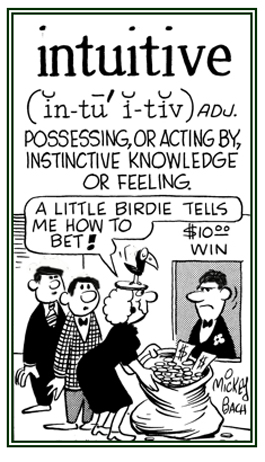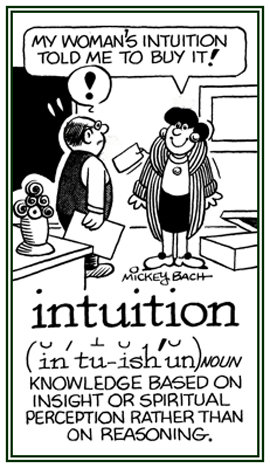tuit-, tut-
(Latin: to look after, watch over; watcher, guardian)
intuit (verb), intuits; intuited; intuiting
To know or to perceive facts without the need to have them presented because of what a person senses rather than because of any evidence: Jerome was able to intuit that he should not go for a walk in the afternoon long before the heavy rain and hailstorm started to fall.
1. The immediate perception or understanding of truths, facts, etc. that are perceived or understood with immediate recognition without the need for having a specific reason: Having experience with several kinds of people, Doctor Jones had developed great powers of intuition.
2. A natural ability or power that makes something possible to know about without any evidence or proof: Sharon's intuition was telling her that something was wrong with her car and that she should not drive it until a mechanic could come and fix it.
4. Etymology: from Late Latin intuitionem, "a gazing at, a looking at"; from Latin intueri, "to consider, to look upon, to contemplate"; in, "at, on" + tueri, "to look at, to watch".

© ALL rights are reserved.

© ALL rights are reserved.
Go to this Word A Day Revisited Index
2. A natural ability or power that makes something possible to know about without any evidence or proof: Sharon's intuition was telling her that something was wrong with her car and that she should not drive it until a mechanic could come and fix it.
4. Etymology: from Late Latin intuitionem, "a gazing at, a looking at"; from Latin intueri, "to consider, to look upon, to contemplate"; in, "at, on" + tueri, "to look at, to watch".


Go to this Word A Day Revisited Index
so you can see more of Mickey Bach's cartoons.
intuitional (adjective), more intuitional, most intuitional
The doctrine that the perception or recognition of primary truth is direct and immediate without the need for any facts.
A person who has the theory that basic principles and truths are known directly by premonition, insight or the 6th sense: Albert was known among his friends in the police department to be an intuitionalist because his feelings, hunches, or instincts were almost always accurate in solving criminal cases.

© ALL rights are reserved.
Go to this Word A Day Revisited Index

Go to this Word A Day Revisited Index
so you can see more of Mickey Bach's cartoons.
intuitionally (adverb), more intuitionally, most intuitionally
intuitive (adjective), more intuitive, most intuitive
1. Pertaining to the ability to know or anticipate something without any obvious evidence that it could happen: Jane has an intuitive understanding of what should be done in the future for the company's success.
2. Descriptive of an agreement about what seems naturally right: James had an intuitive conception that what the politician said was correct.

© ALL rights are reserved.
Go to this Word A Day Revisited Index
2. Descriptive of an agreement about what seems naturally right: James had an intuitive conception that what the politician said was correct.

Go to this Word A Day Revisited Index
so you can see more of Mickey Bach's cartoons.
intuitively (adverb), more intuitively, most intuitively
Relating to what seems naturally correct: A chef at the restaurant where Shirley eats her lunches intuitively compiles meals for his customers rather than from recipes.
The state of having insight or an innate feeling instead of just relying on facts or evidence concerning something: Marion's intuitiveness told her not to drive her car on the freeway that day, but to take the small roads through the towns; and the accidents that happened on the expressway proved that she was right.

© ALL rights are reserved.
Go to this Word A Day Revisited Index

Go to this Word A Day Revisited Index
so you can see more of Mickey Bach's cartoons.
1. Payments that are paid to an educational establishments by students for the right to study there: Karl's parents are paying his tuition so he can attend the university next year.
2. Etymology: from Latin tuitionem, "guard, protection, defense; from tui-,stemof tueri, "to look after, to protect, to watch over".
2. Etymology: from Latin tuitionem, "guard, protection, defense; from tui-,stemof tueri, "to look after, to protect, to watch over".
The meaning of "money paid for teaching or instruction" is first recorded in 1828, in American English, probably a shortening of "tuition money, tuition fees", and derives from the earlier extended meaning of "an act of teaching, instruction of a pupil or pupils".
tuitional (adjective), more tuitional, most tuitional
1. The teaching of an individual student by an instructor: Jim studied music under the tutelage of his father who was a professional musician.
2. A helpful influence or guidance: Jim's company is relying on the tutelage of its new CEO to increase profits.
2. A helpful influence or guidance: Jim's company is relying on the tutelage of its new CEO to increase profits.
Someone who has the powers to protect or to be a guardian of others.
tutelary (adjective), more tutelary, most tutelary
Referring to being or serving as a guardian or protector.
1. An experienced educator who works with a learner: Joseph said that he had to get a special tutor to help him with his math homework.
2. Etymology: from Latin tutor, a derivative of tueri, "to look after" another, "to protect".

© ALL rights are reserved.
Go to this Word A Day Revisited Index
2. Etymology: from Latin tutor, a derivative of tueri, "to look after" another, "to protect".
The term tutor was originally used to mean "a guardian" or "a protector".

Go to this Word A Day Revisited Index
so you can see more of Mickey Bach's cartoons.
Showing page 1 out of 2 pages of 21 main-word entries or main-word-entry groups.

